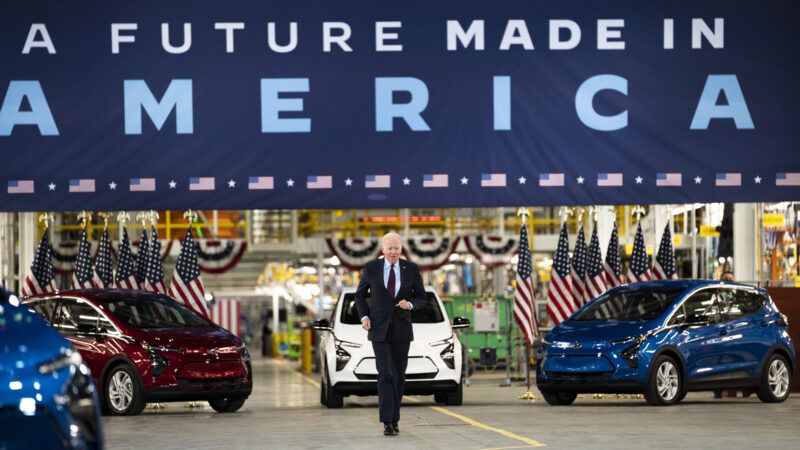The Build Back Better Bill Will Give You $12,000 for Buying an Electric Car. Unless It's a Tesla.
Only vehicles made in unionized U.S. factories qualify for the full amount.

On Friday, the House of Representatives passed the Build Back Better Act, President Joe Biden's signature legislation. Despite being much smaller than it was when initially proposed, the bill is still stuffed with Democratic wish list items, including policies on climate change, child care, family leave, and immigration. The bill is expected to face opposition, and likely some pruning, when it reaches the Senate. One proposal jumps out as an obvious contender for the chopping block.
As part of Biden's plan to rein in carbon emissions, the bill contains a provision which would provide a $7,500 tax rebate to any consumer who purchases an electric vehicle (EV), including both all-electric and plug-in hybrids. However, that amount increases by $4,500 if the car was manufactured in a unionized U.S. factory, as well as by an additional $500 if the vehicle contains a U.S.-made battery.
Ostensibly, this provision is part of Biden's "Buy American" policy of incentivizing or mandating purchases to be made domestically. In practice, the order has simply carried over the protectionism of the Trump trade policy and increased costs to taxpayers. The EV credit proposal, though, is much more egregious, in that it not only incentivizes a particular type of product, but incentivizes particular brands, as well.
If enacted as written, the bonus $4,500 in EV credits could only apply to cars made by Ford, General Motors, and Stellantis (formerly Fiat Chrysler). In other words, a driver who wants to purchase a hybrid Toyota Camry, which U.S. News & World Report ranks as having "Great" reliability, does not qualify for the extra money, even though the car is manufactured in Kentucky. But if that same shopper elects to purchase a Chevrolet Bolt, which recently halted production because the batteries were catching fire, they would receive the extra rebate. As a matter of fact, out of more than 50 EVs currently on the market, the only vehicles which currently qualify for the extra money are two variations of the Bolt.
This is what is most pernicious about this policy: Rather than simply a blanket advantage for American companies (which would be bad enough), it is a clear giveaway to the United Auto Workers (UAW). In October, when Biden visited a UAW job training center, he bragged about the EV proposal, saying "I want those jobs here in Michigan"—rather than in states like Tennessee or Kentucky, where UAW membership is less of a certainty.
In fact, it is clear that the union aspect of the policy was more important than the actual consumer incentive. As The Wall Street Journal reported last week, Rep. Dan Kildee (D-Mich.), the provision's co-author, stated that he included the bonus funding after being advised by General Motors and UAW "about the importance of including an explicitly pro-union component."
As a means of lessening not only carbon emissions, but exhaust pollution, shifting to EVs is a perfectly laudable step (though by no means a silver bullet). But when the transition is accomplished by executive fiat rather than consumer choice or market incentive, it risks undermining the entire goal. And in this instance, customers are being nudged for political reasons: a kickback to a key constituency of Biden's party.



Show Comments (192)